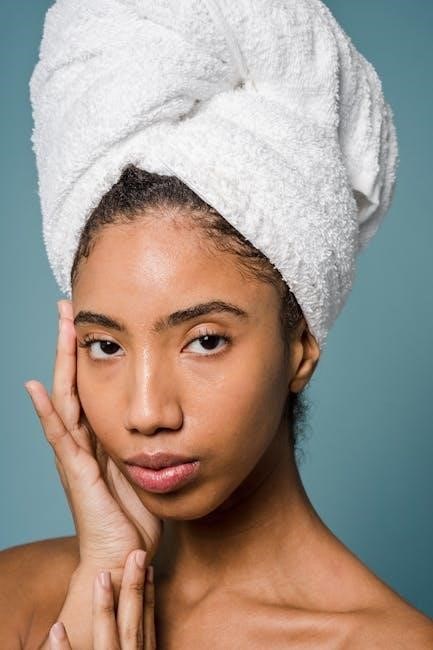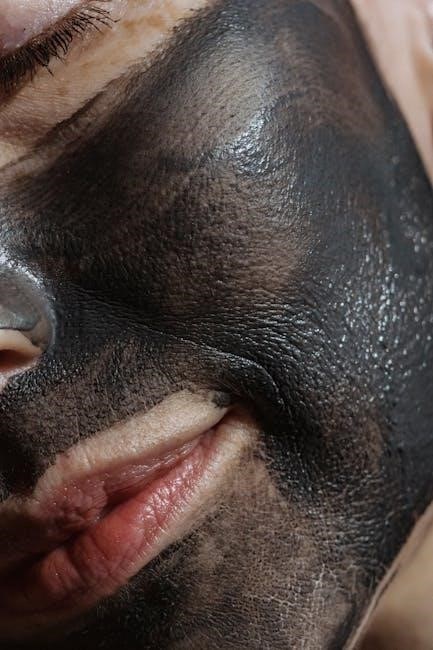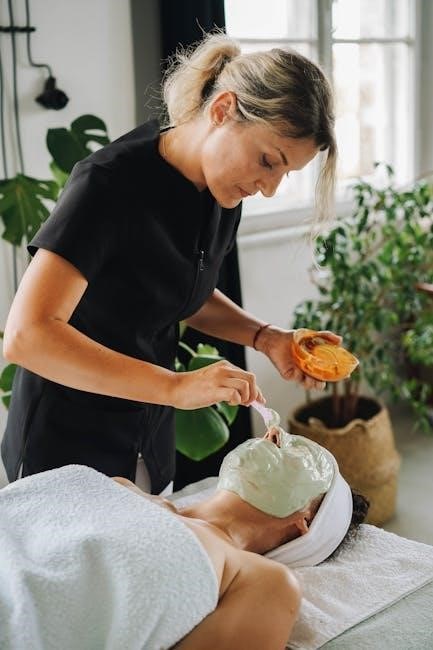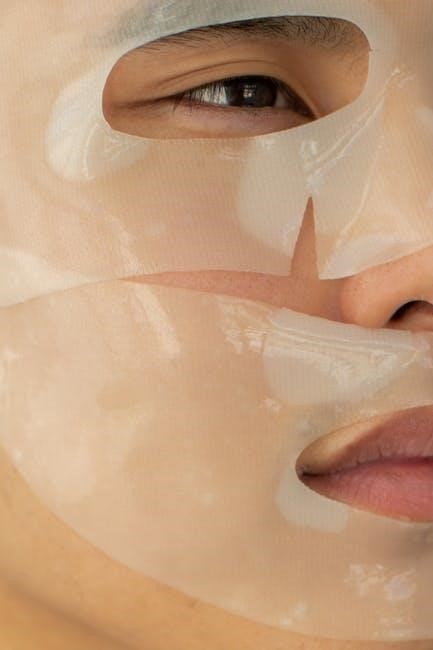Black cosmetology is a cultural practice rooted in African heritage, emphasizing beauty, identity, and empowerment․ It celebrates diverse beauty standards and fosters cultural pride and affirmation․
1․1 Historical Evolution of Black Cosmetology
Black cosmetology has a rich history rooted in African traditions, with practices evolving over centuries․ Ancient Africans used natural ingredients like shea butter and coconut oil for beauty and spiritual rituals․ During the transatlantic slave trade, these traditions were suppressed but later revived in the 1900s through pioneers like Madam C․J․ Walker, who revolutionized hair care for Black women․ The Civil Rights Movement further influenced the industry, promoting natural beauty and self-acceptance․ Today, Black cosmetology continues to celebrate African heritage while addressing diverse beauty needs, blending tradition with modern innovation․
1․2 Cultural Significance of Beauty Practices in the Black Community
Beauty practices in the Black community hold profound cultural significance, reflecting identity, resilience, and heritage․ Rooted in African traditions, these practices often serve as acts of self-love and empowerment․ Hair styling, for instance, is not just aesthetic but a celebration of cultural richness and creativity․ Through braiding, natural hairstyles, and skincare routines, individuals connect with their ancestry and community․ These practices also foster unity, providing spaces for shared experiences and mutual support․ They are a testament to the enduring strength and vibrancy of Black culture, transcending mere aesthetics to embody pride, resistance, and the celebration of Blackness․
1․3 The Role of Cosmetology in Empowering Black Identity
Cosmetology plays a pivotal role in empowering Black identity by providing tools for self-expression and confidence․ It challenges Eurocentric beauty norms, promoting inclusivity and diversity․ Through innovative hairstyles, skincare, and makeup, individuals reclaim their cultural heritage and celebrate their uniqueness․ Cosmetology fosters a sense of pride, enabling Black individuals to embrace their features and reject societal stereotypes․ It also serves as a platform for community building, creating spaces where shared experiences and traditions are honored․ By empowering self-love and cultural affirmation, cosmetology becomes a powerful means of asserting Black identity and resilience in the face of systemic marginalization․
The Natural Hair Movement and Its Impact
The Natural Hair Movement promotes embracing natural textures, rejecting chemical treatments, and celebrating Black beauty․ It fosters self-acceptance, challenges societal norms, and empowers Black identity globally․
2․1 Origins and Key Milestones of the Natural Hair Movement
The Natural Hair Movement traces its origins to the 1960s Civil Rights era, with the Black Pride movement emphasizing African heritage and rejecting Eurocentric standards․ The 2000s saw a resurgence, driven by online communities and hair blogging․ Key milestones include the launch of NaturallyCurly in 2008 and the rise of social media platforms like Instagram, which amplified the movement․ Pioneers like Ouidad and Miss Jessie’s introduced products catering to natural textures, while events like Natural Hair Meetups fostered community․ The movement gained momentum in 2014 with #TeamNatural, celebrating diversity and challenging societal norms, leading to greater acceptance and representation in media and beauty industries․
2․2 The Role of Hair Blogging in Promoting Natural Beauty
Hair blogging has played a pivotal role in promoting natural beauty by sharing tips, products, and personal journeys․ Bloggers like Ouidad and Miss Jessie’s became influential voices, fostering a sense of community․ These platforms educated individuals on hair care, debunking myths and challenging Eurocentric beauty ideals․ By showcasing diverse textures and styles, bloggers empowered individuals to embrace their natural beauty․ The movement also celebrated cultural identity, turning hair into a symbol of resilience and self-love․ Through storytelling and advocacy, hair blogging has been instrumental in reshaping perceptions of beauty and fostering inclusivity in the beauty industry․
2․3 Challenges Faced by the Natural Hair Community
The natural hair community faces numerous challenges, including societal discrimination and the lingering effects of Eurocentric beauty standards․ Many individuals encounter bias in workplaces and schools, where natural hairstyles are often deemed unprofessional․ Cultural appropriation further complicates the movement, as Black cultural expressions are frequently co-opted without proper understanding or credit․ Additionally, the beauty industry’s historical lack of inclusivity has left a gap in products catering to diverse textures, forcing many to rely on niche or homemade solutions․ These obstacles underscore the ongoing struggle for acceptance and representation in a world dominated by traditional beauty norms․

Cultural and Social Perspectives on Black Beauty
Black beauty is a testament to African heritage and creativity, shaped by centuries of societal perceptions․ It reflects resilience, self-expression, and the redefinition of beauty on one’s own terms․
3․1 The Influence of African Diasporic Traditions on Cosmetology
African diasporic traditions deeply shape Black cosmetology, preserving cultural identity through practices like braiding, beadwork, and natural hair styling․ These methods, passed down generations, symbolize community, artistry, and resilience․ They reflect the blending of ancestral techniques with modern innovations, creating a unique aesthetic that honors heritage while embracing contemporary beauty standards․ Such traditions not only beautify but also serve as a form of cultural resistance and pride, connecting individuals to their roots and fostering a sense of belonging within the global Black community․
3․2 Representation of Black Beauty in Media and Advertising
Historically, Black beauty has been marginalized in media and advertising, with limited representation that often perpetuates Eurocentric standards․ However, recent years have seen progress, with increased visibility of Black models, influencers, and celebrities․ Campaigns like Fenty Beauty’s diverse shade range have challenged the industry to embrace inclusivity․ Despite this, challenges remain, such as tokenism and the underrepresentation of darker-skinned individuals․ The growing demand for diverse representation reflects a broader cultural shift, celebrating Black beauty in its entirety and fostering pride and empowerment within the community․ This visibility is crucial for reshaping beauty ideals and promoting equity in the industry․
3․3 The Intersection of Race and Beauty Standards
The intersection of race and beauty standards has historically marginalized Black features, perpetuating Eurocentric ideals․ Skin color, hair texture, and facial features have been subjected to societal hierarchies, with darker skin and kinky hair often devalued․ This has led to internalized racism and low self-esteem for many Black individuals․ The beauty industry’s reliance on these standards has further entrenched exclusion, limiting opportunities for Black models and influencers․ However, the natural hair movement and increasing diversity in media have challenged these norms, fostering a reclamation of Black beauty and promoting inclusivity․ This shift reflects broader societal efforts to dismantle racial biases in beauty ideals;
Entrepreneurship in Black Cosmetology

Black entrepreneurship in cosmetology has driven innovation, empowering communities and challenging traditional beauty norms․ Pioneers like Madam C․J․ Walker and modern brands like Fenty Beauty have revolutionized the industry․
4․1 Pioneers in the Black Beauty Industry
Madam C․J․ Walker and Annie Turnbo Malone were trailblazers, creating hair care products for Black women in the early 20th century․ Their innovations laid the foundation for modern Black cosmetology, fostering economic empowerment and self-esteem within the community․
Walker became one of the wealthiest self-made women of her time, while Malone pioneered hair growth formulas․ Their legacies continue to inspire, showcasing the transformative power of entrepreneurship in celebrating Black beauty and challenging societal norms․
4․2 Modern Black-Owned Cosmetology Brands
Modern Black-owned cosmetology brands like Fenty Beauty, Bounce Curl, and SheaMoisture have revolutionized the industry by offering inclusive products catering to diverse textures and tones․ These brands emphasize natural ingredients, cultural authenticity, and empowerment․
By challenging Eurocentric beauty standards, they promote self-love and celebrate Black beauty globally․ Their success has fostered a movement toward greater representation and diversity in the beauty industry, inspiring a new generation of entrepreneurs to embrace and innovate in Black cosmetology․
4․3 Innovations in Product Development for Diverse Textures
Innovations in product development for diverse textures have been transformative, with brands creating tailored solutions for curly, kinky, and coily hair․ Products like sulfate-free shampoos, leave-in conditioners, and curl-defining creams address specific needs, promoting healthy hair care․
These advancements reflect a deeper understanding of Black hair’s unique characteristics, fostering inclusivity and self-acceptance․ By prioritizing natural ingredients and texture-specific formulations, modern cosmetology continues to empower individuals, celebrating the beauty of Black hair in all its forms;

Challenges and Controversies in Black Cosmetology
Black cosmetology faces challenges like discrimination, cultural appropriation, and Eurocentric beauty standards, impacting representation and inclusivity in the industry and society․
5․1 Discrimination and Racism in the Beauty Industry
Discrimination and racism in the beauty industry persist, with Black individuals often facing limited product options and biased marketing․ Historical exclusion has marginalized Black beauty, perpetuating Eurocentric standards․ Many brands lack diversity in shade ranges, especially for darker skin tones․ Additionally, there is a lack of representation in leadership roles, contributing to systemic inequality․ These issues highlight the need for greater inclusivity and equity to ensure Black consumers and professionals receive fair treatment and opportunities within the industry․
5․2 The Debate Over Cultural Appropriation in Beauty Trends
Cultural appropriation in beauty trends sparks intense debate, particularly regarding Black cultural elements like hairstyles and makeup․ Borrowing without understanding or credit can perpetuate inequality․ Styles such as box braids and dreadlocks, deeply rooted in African heritage, are often adopted by non-Black individuals without acknowledgment․ This leads to frustration, as Black communities face scrutiny for the same styles․ The beauty industry must navigate this by promoting respectful appreciation and collaboration․ Black-owned brands are reclaiming these traditions, fostering empowerment and challenging systemic exploitation of Black culture for profit, advocating for equitable representation and credit in beauty practices․
5․3 The Impact of Eurocentric Beauty Standards on Black Women
Eurocentric beauty standards have historically marginalized Black women, promoting features like straight hair and light skin as ideals․ This has led to internalized racism and self-esteem issues, as Black features are often devalued in media and society․ The pressure to conform has driven many to adopt damaging practices, such as chemical straightening or skin bleaching, to meet these standards․ However, the natural hair movement and increased representation are challenging these norms, empowering Black women to embrace their natural beauty․ By reclaiming their cultural heritage, they resist Eurocentric ideals and redefine beauty on their own terms․

The Future of Black Cosmetology
Black cosmetology’s future lies in cultural empowerment, innovation, and sustainability․ It will prioritize diverse textures, ethical practices, and education to foster inclusivity and celebrate Black beauty globally․
6․1 Emerging Trends in Black Beauty and Grooming
Emerging trends in Black beauty and grooming emphasize natural textures, cultural pride, and sustainability․ The rise of clean, vegan products catering to diverse hair types reflects a shift toward healthier, eco-conscious routines․ Social media platforms amplify these trends, fostering a sense of community and empowerment․ Innovations in styling tools and techniques, such as advanced curl-defining methods and protective hairstyles, are gaining popularity․ Additionally, the celebration of melanated skin through skincare tailored to deeper tones highlights a growing demand for inclusive beauty solutions․ These trends not only challenge Eurocentric standards but also promote self-love and the embracing of Black identity on a global scale․
6․2 The Role of Education and Awareness in Advancing the Industry
Education and awareness are pivotal in advancing Black cosmetology, fostering inclusivity and cultural appreciation․ Workshops, online courses, and certifications are equipping professionals with knowledge of diverse hair textures and skincare needs․ Social media platforms amplify awareness, challenging stereotypes and promoting Black beauty standards․ Educational initiatives also address historical gaps in product development, encouraging innovation for underrepresented communities․ By bridging these knowledge gaps, education empowers both professionals and consumers, driving the industry toward greater inclusivity and cultural sensitivity․ This collective effort ensures that Black beauty practices are celebrated, respected, and integrated into the global cosmetology landscape․
6․3 Sustainability and Ethical Practices in Black Cosmetology
Sustainability and ethical practices are transforming Black cosmetology, prioritizing eco-friendly ingredients and cruelty-free testing․ Brands are adopting environmentally conscious packaging and sourcing raw materials responsibly․ Ethical labor practices ensure fair wages and safe working conditions, aligning with the community’s values․ Education on sustainable beauty routines empowers consumers to make informed choices․ Supporting Black-owned businesses committed to these practices fosters economic growth and cultural preservation․ By integrating sustainability, the industry not only reduces its environmental footprint but also strengthens its connection to the community, promoting a healthier and more ethical future for Black cosmetology․